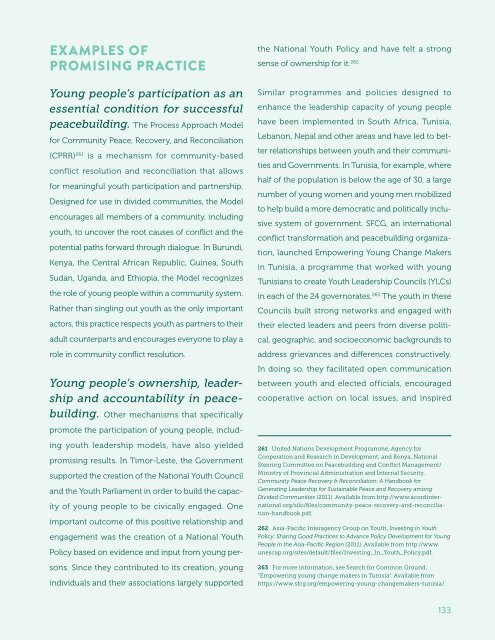YOUTH CIVIC
JieguI2U
JieguI2U
Create successful ePaper yourself
Turn your PDF publications into a flip-book with our unique Google optimized e-Paper software.
EXAMPLES OF<br />
PROMISING PRACTICE<br />
Young people’s participation as an<br />
essential condition for successful<br />
peacebuilding. The Process Approach Model<br />
for Community Peace, Recovery, and Reconciliation<br />
(CPRR) 261 is a mechanism for community-based<br />
conflict resolution and reconciliation that allows<br />
for meaningful youth participation and partnership.<br />
Designed for use in divided communities, the Model<br />
encourages all members of a community, including<br />
youth, to uncover the root causes of conflict and the<br />
potential paths forward through dialogue. In Burundi,<br />
Kenya, the Central African Republic, Guinea, South<br />
Sudan, Uganda, and Ethiopia, the Model recognizes<br />
the role of young people within a community system.<br />
Rather than singling out youth as the only important<br />
actors, this practice respects youth as partners to their<br />
adult counterparts and encourages everyone to play a<br />
role in community conflict resolution.<br />
Young people’s ownership, leadership<br />
and accountability in peacebuilding.<br />
Other mechanisms that specifically<br />
promote the participation of young people, including<br />
youth leadership models, have also yielded<br />
promising results. In Timor-Leste, the Government<br />
supported the creation of the National Youth Council<br />
and the Youth Parliament in order to build the capacity<br />
of young people to be civically engaged. One<br />
important outcome of this positive relationship and<br />
engagement was the creation of a National Youth<br />
Policy based on evidence and input from young persons.<br />
Since they contributed to its creation, young<br />
individuals and their associations largely supported<br />
the National Youth Policy and have felt a strong<br />
sense of ownership for it. 262<br />
Similar programmes and policies designed to<br />
enhance the leadership capacity of young people<br />
have been implemented in South Africa, Tunisia,<br />
Lebanon, Nepal and other areas and have led to better<br />
relationships between youth and their communities<br />
and Governments. In Tunisia, for example, where<br />
half of the population is below the age of 30, a large<br />
number of young women and young men mobilized<br />
to help build a more democratic and politically inclusive<br />
system of government. SFCG, an international<br />
conflict transformation and peacebuilding organization,<br />
launched Empowering Young Change Makers<br />
in Tunisia, a programme that worked with young<br />
Tunisians to create Youth Leadership Councils (YLCs)<br />
in each of the 24 governorates. 263 The youth in these<br />
Councils built strong networks and engaged with<br />
their elected leaders and peers from diverse political,<br />
geographic, and socioeconomic backgrounds to<br />
address grievances and differences constructively.<br />
In doing so, they facilitated open communication<br />
between youth and elected officials, encouraged<br />
cooperative action on local issues, and inspired<br />
261 United Nations Development Programme, Agency for<br />
Cooperation and Research in Development; and Kenya, National<br />
Steering Committee on Peacebuilding and Conflict Management/<br />
Ministry of Provincial Administration and Internal Security,<br />
Community Peace Recovery & Reconciliation: A Handbook for<br />
Generating Leadership for Sustainable Peace and Recovery among<br />
Divided Communities (2011). Available from http://www.acordinternational.org/silo/files/community-peace-recovery-and-reconciliation-handbook.pdf.<br />
262 Asia-Pacific Interagency Group on Youth, Investing in Youth<br />
Policy: Sharing Good Practices to Advance Policy Development for Young<br />
People in the Asia-Pacific Region (2011). Available from http://www.<br />
unescap.org/sites/default/files/Investing_In_Youth_Policy.pdf.<br />
263 For more information, see Search for Common Ground,<br />
“Empowering young change makers in Tunisia”. Available from<br />
https://www.sfcg.org/empowering-young-changemakers-tunisia/.<br />
133


